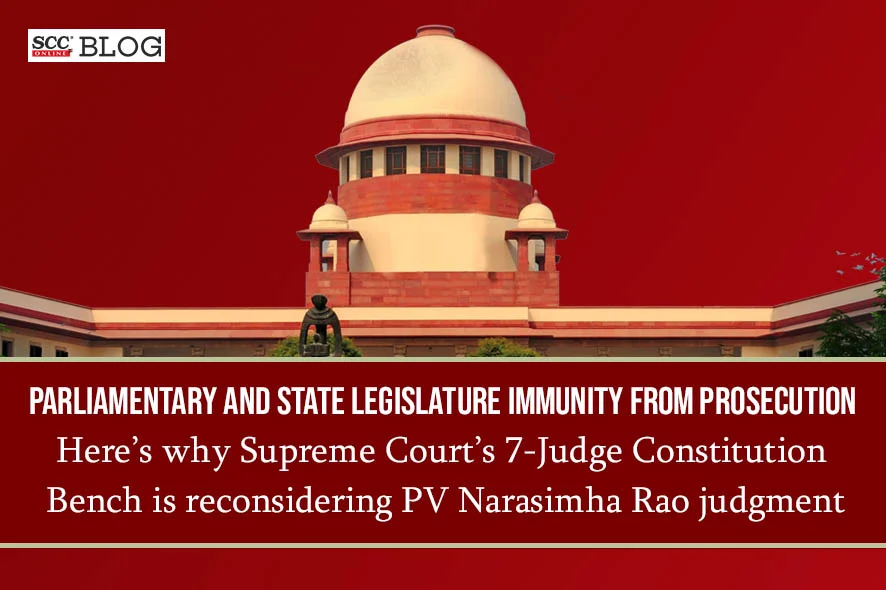Article 105(2) of the Constitution of India grants immunity to Members of Parliament (‘MPs’) against prosecution in respect of anything said or any vote given by him in Parliament or any committee. Article 194(2) of the Constitution grants similar immunity to the members of Legislative Assembly.
In case of P.V. Narasimha Rao v. State (CBI/SPE), (1998) 4 SCC 626, the Constitution Bench of 5 judges upheld immunity to the MPs as per Article 105(2) including the speech or vote made in furtherance of receiving illegal gratification/bribe for making a speech or voting particularly.
The Jharkhand High Court while considering somewhat similar facts in Sita Soren v. Union of India, 2014 SCC OnLine Jhar 302 relied on the majority decision in P.V. Narasimha Rao (supra) to refuse such immunity to a member of Legislative Assembly since she received money but voted against the requirement.
Now, since the Jharkhand High Court’s decision has been challenged before the Supreme Court, the 7-Judge Constitution Bench is going to reconsider the decision in P.V. Narasimha Rao (supra) to relook at the scope of immunity for Members of Parliament and State Legislatures. To understand what exactly happened in the two cases, explore below.
What happened in P.V. Narasimha Rao case?
Digging the roots, the issue was triggered after 10th General Election of the Lok Sabha held in 1991 wherein, Congress emerged as the largest party which formed government with P.V. Narasimha Rao as the Prime Minister. No confidence motion was moved in the Lok Sabha on 26-07-1993 against Narasimha Rao’s minority government, which could be defeated by support of 14 members. However, the minority government lost after 251 members voted in support and 265 voted against. Some members voted against the no-confidence motion, while some others abstained from voting, which led to filing of a complaint with the Central Bureau of Investigation alleging that a criminal conspiracy was hatched after some of the members received bribes to vote against no-confidence motion.
Prosecution traced through Special Judge, dismissal of petition before High Court seeking quashment of charges, hearing before three-judge Bench of Supreme Court and further reference to the Constitution Bench consisting of S.C. Agrawal, G.N. Ray, Dr. A.S. Anand, S.P. Bharucha and S. Rajendra Babu, JJ.
The Constitution Bench particularly focused upon Article 105(2) of Constitution of India which provides for immunity to Members of Parliament against prosecution for receiving illegal gratification/bribe for making a speech or voting particularly.
The majority of Constitution Bench held that the MPs who allegedly accepted bribe and voted against the no-confidence motion were entitled to immunity under Article 105(2) of Constitution. It said that “no member (of Parliament) is answerable in a court of law or any similar tribunal for what he has said in Parliament. This again is recognition of the fact that a member needs the freedom to say what he thinks is right in Parliament undeterred by the fear of being proceeded against. A vote, whether cast by voice or gesture or the aid of a machine, is treated as an extension of speech or a substitute for speech and is given the protection that the spoken word has.”
The minority opinion by S.C. Agrawal and Dr. A.S. Anand, JJ. stood against extension of immunity for having received bribe for the purpose of giving a vote in the House for the acts preceding the making of such speech or giving vote by the MP.
What happened in Jharkhand High Court’s Sita Soren case?
As against the Members of Parliament, the issue in this case pertained to immunity for members of the State Legislatures as per Article 194(2) of Constitution, being pari materia to Article 105(2). This case revolved around complaints of Horse Trading during election of the Council of the States, and facts reflected that after receiving money, the said member did caste vote, but not in favour of the bribe giver. The Court relied on the majority view in P.V. Narasimha Rao (supra) to express that the act of receiving money had no nexus with the alleged conspiracy or the act of casting vote by the petitioner.
The Court viewed that the petitioner’s act of receiving money pursuant to the conspiracy and agreement with bribe giver lacked nexus with the vote due to the fact that she did not cast vote in favour of the said person and will have no immunity as guaranteed under Article 194(2) of the Constitution. The Court refused to quash the order of taking cognizance against the petitioner.
7-Judge Constitution Bench to reconsider PV Narasimha Rao Judgment
Since the decision in Sita Soren (supra), decided by the Jharkhand High Court, was appealed against, the Supreme Court constituted 7-Judge Constitution Bench comprising of Dr. Justice DY Chandrachud, CJI, AS Bopanna, MM Sundresh, Pamidighantam Sri Narasimha, JB Pardiwala, Sanjay Kumar and Manoj Misra, JJ. to hear Criminal Appeal in Sita Soren v. Union of India.








